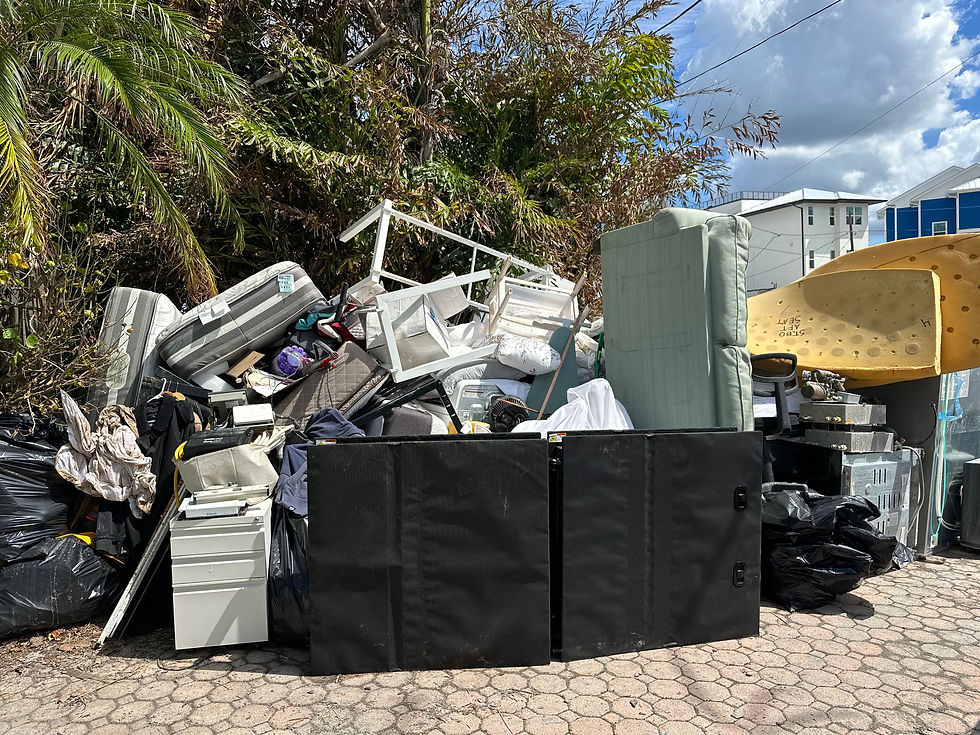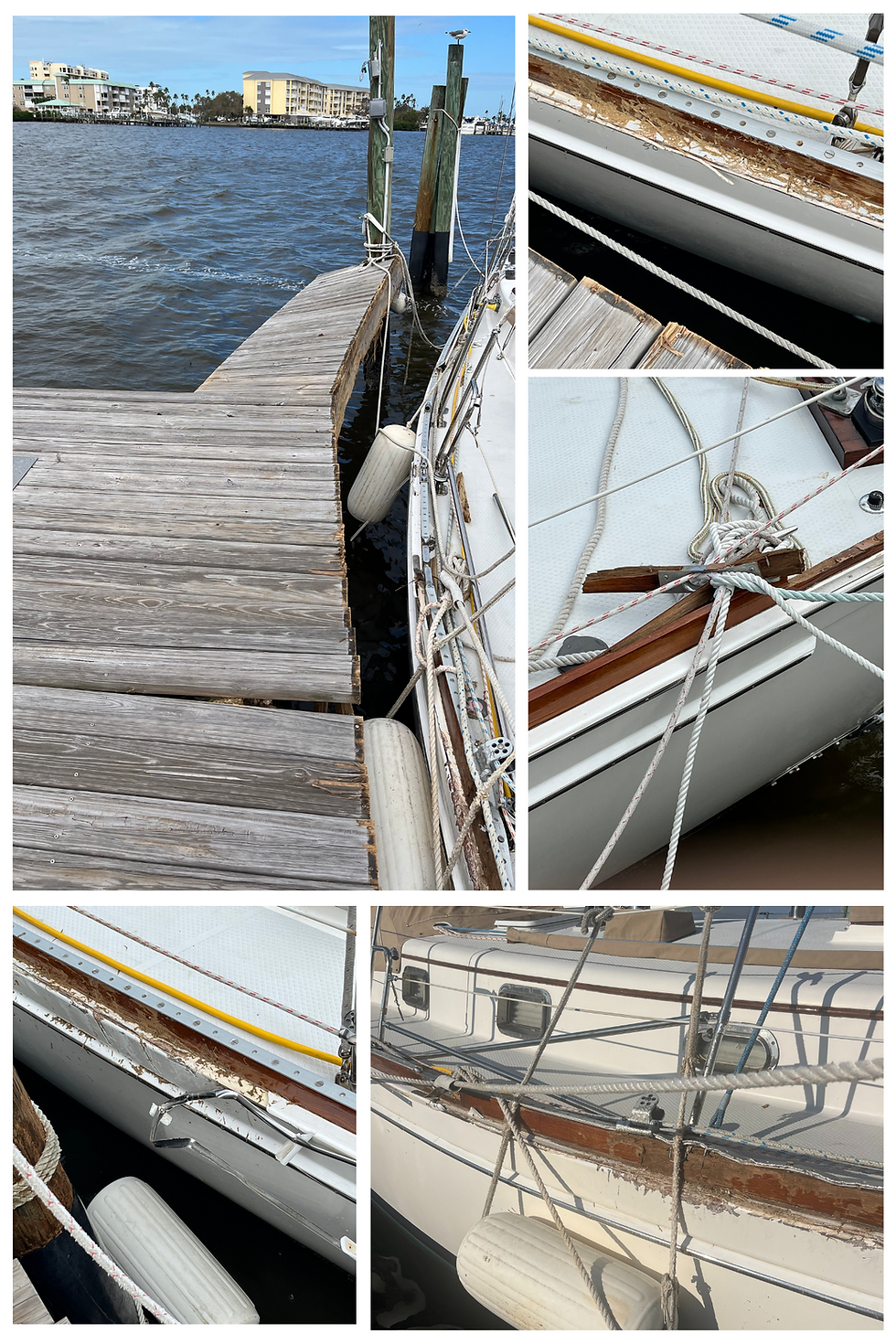Hurricane Blues
- hemcclain
- Apr 18, 2025
- 7 min read
As I write this, my boat floats atop the cerulean blue waters of the Exumas, and the friendly nurse shark that cruises the anchorage is feet from our keel. Our friends are anchored nearby, we're sunburned from the beach, and we're going snorkeling tomorrow. Which is all to say that things are good now, we are out here, and our real adventure has begun. I haven't written a post in a while, not because there has been nothing to report but because it's hard for me to write about what caused a five-month delay in our plans. If I'm honest, it was a really tough thing to go through, and I have been hesitant to write about it. Because when you take a huge risk and drop everything to pursue a goal that is a bit unconventional, and then your plans are derailed for an indefinite time, you even find your own brain telling you that you don't have a right to complain, that this is probably just the nail in the coffin for an idea that was never to come to fruition anyways. It is finally with the perspective of both a little time and distance that I can write about what happened without the pit-in-my-stomach feeling of not knowing whether we will ever make it out of Florida at all. So, now I relay our story of Hurricanes Helene and Milton.
Dawn on a bright, unusually hot September day in Japan found Ian and I on a bullet train drinking our morning coffee and eating our typical travel breakfast of assorted onigiri and pastries from 7/11. At 180 miles per hour we sped from the ancient, low-lying city of Kyoto to the modern, skyscraper-dominated skyline of Hiroshima. At that same moment Helene, a behemoth Category 4 hurricane, was barreling across the Gulf of Mexico toward Florida, pushing winds of up to 140 miles per hour closer to our boat and home. Morning for us in Japan was evening in Florida and my sister Sarah, her fiancé Jimmy, and my parents were all busy making final preparations for the incoming storm. Cars were moved out of flood zones. My dad and sister boarded up my dad's house, carefully caulking around the boards to help prevent water intrusion. Ian and I had been living in his house while our boat underwent an extensive refit that had rendered it unlivable for the time being. We had left our boat surrounded by a thick web of dock lines and multiple anchors were out in several directions to hold the boat in place. Nerves were high, despite everyone's knowledge that there had been many, many threats before, yet Tampa Bay had always been lucky. Hurricanes never seemed to severely impact the Tampa Bay area. Not for 100 years, anyways.
By the time we arrived in Hiroshima in late morning and were on a bus to the Peace Memorial Museum, it was getting so late in Florida that my family was going to bed. Since my dad and sister had evacuated from their waterfront homes, we knew that it would probably be awhile before we would have an update on the storm's effect on our boat or my dad's house, our home at the time. What we didn't expect was a call from the U.S. Coast Guard: "Are you safe? We received a distress signal from your EPIRB." In a moment of panic, I thought our boat had sunk. An EPIRB is an emergency position-indicating radio beacon - basically, a device that is automatically activated by exposure to moisture to send a distress signal to the Coast Guard if your vessel sinks. Then I realized that we were the emergency contact for no less than four EPIRBs - three of which were inside my dad's house. The Coast Guard was able to tell us which one it was - it my dad's EPIRB from his fishing boat, which we recalled was on the floor of the foyer closet of his house. We knew at that point that the boards my dad had secured with screws and caulk to the entrances to his house had been overcome by flooding. We hoped it would just be a couple inches of water. It was not.
A second call came while we were in the museum. "Are you safe? We received a distress signal from your EPIRB. Is anyone on the vessel Second Wind?" This was my mom's EPIRB from her sailboat, one she had given us and we hadn't yet re-registered. I recalled leaving it on top of a mini-fridge in our room - the water was rising. Maybe only a foot or so of water had floated the fridge, knocking it over?
The third call came in the afternoon, as we were sitting in the museum lobby, trying to process the devastating exhibits we had just seen about the nuclear bombing of Hiroshima and its aftermath. We were pretty sure the third EPIRB had been left on the kitchen counter. This meant the water was at least three feet high. Imagine muddy and opaque waist-deep water in your home, the furniture bobbing around violently. Not peacefully rising waters but huge waves breaking over your entire home town, destroying sand dunes and sea walls, covering every inch of ground in a mixture of sand, mud, and sewage. We knew at that point that there wasn't a single spot of dry land on the island of Madeira Beach.
We debated cutting our trip short, but it ended up being a moot decision because the destruction was such that the island was completely off-limits for days after the storm. We found out from a neighbor that hadn't evacuated that our boat was still in its slip behind my dad's neighbor's house and was still floating, a huge relief. But the interior of my dad's house was largely destroyed. A lot was lost. Destroyed was the entire boat canvas-making shop I had set up in my dad's spare bedroom, much of our boat equipment that we were storing in the home, and all of our food. Only through great efforts by Sarah, Jimmy and my mom to gather and thoroughly wash our clothes were any of our clothes besides the ones we brought to Japan salvaged. Incredibly, the mattresses onto which Sarah had placed many of our belongings had floated, saving some of the items atop them. We later found out that one of our elderly neighbors only survived the storm by floating on top of a mattress with her two dogs for hours, hoping the water wouldn't rise above her bedroom ceiling and drown them. The flooding in Madeira Beach ranged from around 3-8' depending on location, with my dad's house getting 4' of floodwater.
Immediately upon getting home from Japan we began cleanup, which entailed throwing everything ruined into the front yard for haul away and everything that might be salvageable into the back yard. Then the mud had to be cleaned off of every surface in the house, the appliances discarded, the baseboards torn out, and wet drywall removed. We were homeless during this time, not able to stay at my dad's house anymore and with a boat halfway through a refit. We were couch-surfing with two cats by night and playing demolition team/flood-remediators by day. Then we learned that another hurricane was on the way.



Hurricane Milton was now aimed straight at Tampa Bay. When city officials advised us to secure a loose articles around the house in preparation for the storm we laughed - almost every single item from inside the house was in a wet, moldy, 10' tall pile in front of the house awaiting pickup. Everything we thought we could salvage was drying out in the backyard. If floodwaters came again those items - clothes, furniture, tools, kitchenware, appliances, electronics, rotten food - would be strewn all over the island and there was nothing we could do about it. The house was still too wet and muddy to move things back inside. Once again we boarded up the house, and again we battened down the hatches on Altair. Then we packed up the cats and evacuated to St. Augustine with Sarah and Jimmy.
Milton ended up hitting slightly south of Madeira Beach, bringing strong winds rather than flooding, and sparing my dad's house of any more damage. Unfortunately, Altair was the casualty this time. Despite the web of lines and anchors holding her in place, the wind and wind-driven waves bashed her against the dock, moving the entire dock over by about 4'. She suffered fiberglass and rigging damage, and the rub rails and beautiful teak toe rail on the starboard side of the boat were destroyed. The stainless stanchions and lifelines on the starboard side were mangled. The port side had some fiberglass and rub rail damage from rubbing against a piling. We returned to a boat still floating but now months, rather than weeks, away from being ready to sail away.

Since pretty much every marina and boatyard on the gulf coast of Florida had experienced devastating damage from the hurricanes, finding someone to help us fix the boat was a challenge that took many weeks Finally we were able to piece together the help of multiple independent contractors to fix all the damage over the course of the winter. Today, a lot of blood, sweat, and dollars later, Altair sits as beautiful and functional as she ever was. The hurricanes delayed our cruising plans by five months, making it impossible for us to cruise the Caribbean this year before hurricane season begins once again, so we set our sights on the Bahamas instead. With some 700 Bahamian islands, we knew there would be more than enough to keep us busy until June. So, with a newfound respect for the weather and understanding the true meaning of the old adage 'sailing = boat repairs in exotic places,' we headed south.




Comments